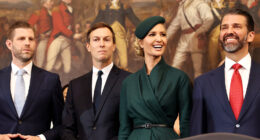Historically a ceremonial Māori war dance, the haka was intended as a challenge to opponents and a rallying cry before heading into battle, though today it is also used to celebrate Māori identity and culture and as a way of unifying people at times of grief.
The sights and sounds of the Haka – feet stomping, fists pumping, vocal cords straining – are deeply entrenched within New Zealand culture and have been famously adopted by the country’s rugby teams as a pre-match ritual.

Some 6500 participants joined the record-breaking feat in Auckland on Sunday, according to officials at Eden Park, the iconic stadium where the All Blacks have remained undefeated since 1994. The attendance beat record holder France’s 4028 in 2014.
Nick Sautner, Chief Executive of Eden Park, said it’s “more than just numbers… It’s about honouring our cultural legacy on a global stage”.
On Sunday night, participants filled the sports ground with thundering cheers. They huffed out their chests, stomped on the floors, and stuck their tongues out to make intimating facial expressions, according to a video posted on Haka Record’s official Instagram.
“It’s time for [France’s record holder status] to change,” organiser Raukatauri Music Therapy Trust wrote on the official website ahead of the event, issuing a call to participants to “stand as a nation and bring haka home”.
CNN affiliate Radio New Zealand reported that Guinness World Records adjudicator Brian Sobel confirmed the record, although the final number of attendees could still be adjusted.
Speaking to the public broadcaster, Sobel recalled how he felt watching the Haka on stage.

“It hit you like a force. It was very, very impressive to see,” he said.
CNN has reached out to Guinness World Records for comment.
Among the celebrities in the crowd were American TV host Conan O’Brien, New Zealand director Taika Waititi and former boxer David Tua, according to RNZ.
The haka had to be performed for one minute, so the crowd performed Ka Mate, the most well-known haka routine, four times in a row to fulfil the requirement, RNZ reported. The dance was composed by Te Rauparaha, a great Māori leader from the 19th century.
While the haka has been embraced by New Zealanders from many walks of life, the Māori community – which accounts for nearly a fifth of the country’s more than 5 million person population – often faces discrimination that results in poorer health and education outcomes and higher rates of incarceration.
Protests have broken out this year sparked by New Zealand’s right-wing government proposing to dissolve the country’s Māori Health Authority, roll back the use of the Māori language and end limits on tobacco sales – a requirement Māori leaders had sought in an effort to cut high rates of smoking in their community.



